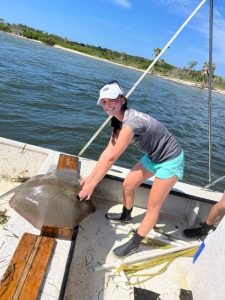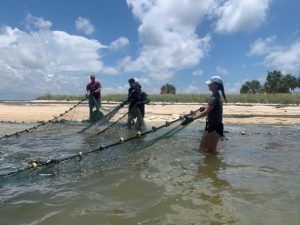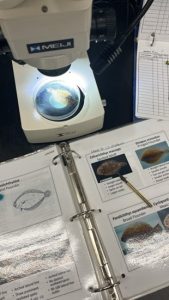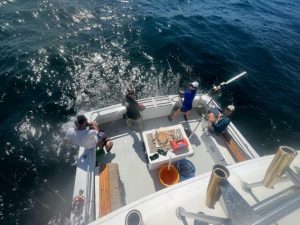Written by Marta Camps-Gonzalez, 2024 undergraduate summer intern hosted by FWC Fisheries Independent Monitoring Program

This summer I had the opportunity to be an intern at the Florida Fish and Wildlife Conservation Commission’s lab in Cedar Key. Specifically, participating in their program Fisheries-Independent Monitoring. This had an inshore and offshore component, and I was lucky enough to be a part of both. During this time, I got to experience life as a marine biologist working with an incredible team of scientists who play a vital role in the maintenance of our local sea life.

Inshore FIM
The most common work being done at this lab is the monthly surveying of Cedar Key in a variety of different areas of the region chosen through stratified random sampling. This ensured an accurate representation of the populations in those habitats was being collected. Using different sampling gears including 600ft and 70ft seines with different sized mesh. We pulled these nets to collect the fish and invertebrates and then they would be measured and identified on the boat to then be released or selected to be brought back to the lab for further sample extraction or identification. At the same time, we also recorded the water quality (salinity, temperature, pH…) and physical factors (shore type, vegetation…) of the site.

Back in the lab, I participated in several tasks one such being dissecting fish to pull otoliths, take muscle tissue for mercury testing, identify gonads to sex. Another important part of the process was recording the data collected into the digital system to make it widely accessible. This required a series of checks and balances to avoid human error. In a similar way, the representative samples of smaller species were analyzed more thoroughly using more detailed identification methods to verify the work done in the field. Being a part of each of these steps helped me become very familiar with the common species we caught, and I learnt to appreciate the importance of accurate data reporting.

Offshore FIM
During the summer, the Cedar Key lab participates in sampling off the panhandle of Florida. This was a very unique experience for me because I got to live on a boat for a couple days. This type of surveying was done through hook and line fishing with a variation of fishing lines, hooks, and baits. At each site, there would be three people fishing at a time and we would drop the baits at the same time till we reached the bottom. At this point, we would start a two-minute timer and by the end of it we would reel back the lines. However, if in this time we felt a fish bite, we would bring it up and wait for the next drop. This was repeated ten times at each site. When a fish was caught, we identified, measured, and inspected it for barotrauma then if it was not one of the select species we needed for further samples, we released it. All of this information was recorded and at the end of the day, we extracted more details on the fish that were kept in a similar way to how we did it in the lab. I had never fished before, but I was able to learn quickly, and I really enjoyed seeing the variety of fish we caught. Doing science on a boat isn’t always easy and we saw this with the unpredictable weather we experienced but it was definitely something I would like to do again in the future.
Thank you
Everything I learned and had the chance to experience during my time as an intern here has made me fall in love with marine biology even more. I am so excited to be able to take all these new skills and knowledge and apply them on my journey to a career in this field. I am so grateful to everyone in the FIM group at Cedar Key for welcoming me, patiently teaching me, and making sure I had a great experience of everything the lab offered. Thank you Jennie, Brian, Will, Hunter, Stephanie, Susan, Liam, Taj, Caleb, and everyone at the lab.
| Follow the link to learn more about the UF/IFAS NCBS Undergraduate Summer Internship program. Read more intern blogs here. |
Featured image credit: UF/IFAS Photo by Tyler Jones
 1
1
